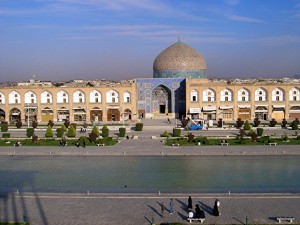 Here’s the next in a series of posts written by Alexa Stevens, a Tufts University student who is one of seven delegates currently traveling (and writing) in Iran with the Citizen Diplomacy Reality Tour trip:
Here’s the next in a series of posts written by Alexa Stevens, a Tufts University student who is one of seven delegates currently traveling (and writing) in Iran with the Citizen Diplomacy Reality Tour trip:
—
Stone-Cold Truths
Sometimes I wonder if all travel isn’t some variation of escape. An escape from somewhere or to something I’m not sure, but a deliberate action of leaving what is known to surround one’s self in the unknown. We had our conference call last week, where the seven of us met each other, over the phone, for the first time. Allow me to explain–our trip is organized by an NGO based out of San Francisco, Global Exchange, and I am one of seven delegates of this tour to Iran.
Everyone spoke of their preparation–Patty, a fund-raiser from Columbia, Maryland, joked about the difficulty of finding a loose-fitting top that would be conservative enough for Iran yet tolerant enough for the heat (highs of 102ºF, lows of 80ºF next week); Rebecca, a freelance writer from Washington DC, talked about the voracious reading she had undertaken, ranging from ancient Persian history to the poetry of the greats–Hafez, Rumi, Ferdowsi–while Tom, a retired attorney from Houston, spoke not of the intellectual preparation he had done, but rather how he was waiting to take it all in once we got there. I spoke of my studies, my scant knowledge of Farsi, and my excitement.
We were all urged to catalogue our preconceptions; write down a few questions we were hoping this trip would answer, or a few hypotheses we would confirm or disprove through the empirical evidence we were sure to gather on this fact-finding mission. This trip, though veiled in the same cloth as a true tourist venture–complete with bilingual native tour guide, bright orange tour bus (or so I hear), and of course us, the American tourists equipped with our guide books, cameras and useless currency–was also supposed to serve as a first-hand educational field guide, footnote to our intellectual conclusions and perceptions.
I get the feeling that in two weeks, upon our return to the US, we are expected to bring back not just souvenirs but true gems of knowledge, which will illuminate our world views, focus our political inclinations and refine our identities.
But I don’t know what my preconceptions are, what I’m hoping this trip will answer, and I’m not quite sure that I’m going to Iran entirely to discover the Iranians and their country. You see, I’m truly hoping to discover more of myself through them. I want to know these people, see this country, connect our worlds, of course–but I’ve invested so much of myself in the study of Iran, what if all my columns of curiosity come crashing down? Truth be told, I’m a little terrified of disappointment; not in Iran, but in myself.
The most common question I get leading up to my departure is the incredulous “Why?” Why would you go to Iran?” And I can’t ever seem to give a coherent answer. I suppose the easiest reason I cite is the default one: oh, its what I’m studying, I’ve been interested in the region for years, I have a few close friends from the Middle East. But I know there must be more to it than that. No one commits them self to studying the foreign if the familiar is truly… Familiar.
Here, in the West, I’m lost. There are so many possibilities–these days, the pressure to be something, to fulfill a professional aspiration, is waning in favor of the pressure to be someone, an intellectual-philosophical-socio-existential aspiration to find yourself and follow your dreams to personal fulfillment. And the prospects are terrifying. There are too many options, too little guidance, too much space, not enough time… We make it far too hard on ourselves, us twenty-somethings on the verge of completing our schooling and venturing into the real world.
So, when I started school I did what I thought was best–I picked something so foreign, so different, I must be defined within it. Studying the Middle East was a way to find myself, to see which truths could be translated across the map and still come back pure. But what if it was all in vain? What if my romantic notions of a country that I already identify with, that I am already enamored with, reveals itself to be like the gems it is famous for (turquoise, in particular is quite prolific in Iran)–beautiful, but impenetrable? There is an element of safety in studying the dissimilar. In conversations with well-intentioned relatives and inquiring friends, the conversation always turns to restrictions, to all the stone-cold realities of Iran today.
I feel protective of the image I’ve built of this place in my head, of what I’ve imagined from books and films–I suppose my perceptions are those of someone who, already committed, begs and pleads that reality confirm her dreams–because if not, she not only loses her knowledge of a place, but of herself.
—
Stay tuned. More updates from Alexa coming soon right here on our Reality Tours blog.
